
With the Ulti, Primus have released their first radiant burner system stove, a model made to perform in the toughest conditions. Robust, fuel-efficient and windproof, this is their most powerful ever stove, and boasts an impressive boil time, making it a real contender for expedition use. Finally, a competitor to the MSR Reactor? Dan Bailey seeks to answer this burning question.
As a gas stove system designed for efficient, wind-resistant and powerful output in testing mountain environments, the Ulti is Primus' recent answer to long-established models such as the MSR Reactor and Jetboil Flash. Like its most obvious rival the Reactor, this stove combines a funky radiant burner and regulated output with a heat exchanger pot, to give you a neat and effective all-in one system. This is a stove designed not so much for al fresco cookery as simply boiling water as quickly and efficiently as possible, a job it does impressively well. In fact it's the most powerful gas stove Primus have ever made. It would be overkill (and over-heavy) for minimalist backpacking in spring/summer weather, and it definitely isn't aimed at the budget end of the market, but in its niche - cold weather and expedition use - it should prove a fantastic bit of kit.
Remote canister design
Unlike the alternative tower stoves, the Ulti has a remote fuel source which means the burner and pot stand a bit lower, giving you a more stable setup for cooking on uneven ground or in the confined space of a tent awning. The additional benefit of this design, rather than one that stacks everything on top of the gas canister, is that the bottle can be inverted, aiding the flow of gas in serious cold.
What do you get?
The Ulti Stove System comes in either 1.0L size (£285), ideal for 1-2 people and the one we've been using, or 1.7L (£315) for 2-3 folk. You get the burner and the pot - but gas of course costs extra. Compared to the Reactor (£250) and the Flash (£150) there's no denying that this stove is heavy on your wallet.
Weight and packability
At 620g for the burner and pot, the Ulti 1.0 is also pretty heavy in your pack. It's a big weight commitment for solo mountaineers and backpackers, and you could save a couple of hundred grams by opting for one of its rivals. However both the burner and the aluminium pot are really robust, and in terms of build this stove is more like a burly Reactor than the slightly flimsier feel of a Flash.
The fuel line rolls into the burner, and the burner nests inside the pot, which has a nice squat shape for easy packing; but sadly with the 1.0L version - and unlike a Reactor or a Flash - you can't also fit in a 100g gas canister. As a result, it's not the most space-efficient model. I make up the limited spare room in the pot with soup and coffee sachets. Worth noting is that if you up-size to the 1.7L version, you can fit in a small gas canister.
For secure packing the handle folds neatly over the lid, holding it closed. It also has a locking slider for security when you're pouring. On both counts the handle design is much more satisfactory than the Reactor's, which I've always found very fiddly.
Performance in use
The broad head and steel mesh of the Ulti's radiant burner will look familiar to anyone who's used a Reactor, and it burns with a similarly impressive orange volcanic glow rather than a standard blue gas flame. This burner head combines catalytic combustion and infrared radiation and, because it's fully enclosed by the heat exchanger on the base of the pot, it's noticeably more wind resistant than an open flame. The breadth of the burner increases its efficiency, spreading heat evenly across the width of the pot.
With its 3000W output it boils water very quickly. With half a potful you barely have time to open your coffee sachet or dinner pouch, and it's there bubbling and steaming away fiercely.
Primus say the Ulti boils 1L in 3:30mins. On a home test near sea level with tap-cold water and a full canister at room temperature, it achieved a proper boil in 4:00, still very impressive.
It's worth noting that variables like air pressure, altitude, ambient temperature and bottle pressure will influence real world performance for any stove, but there's no denying this is one of the fastest boilers on the market, as far as we know beaten only by the Reactor. Of course there's little nuance here; you're not really going to be able to fry or simmer, so actual cooking is out. The Ulti is primarily a hot water producer, whether that's melting snow, making a brew, or rehydrating a packet dinner.
Output is regulated, which keeps gas pressure consistent as the canister empties. Fuel efficiency seems really good too, giving me at least three days of solo use (coffee and porridge for breakfast; soup and hot dinner in the evening) from a 100g canister. While it's a heavy model, if the efficiency means it uses less gas than most rivals, then for longer trips needing multiple canisters an Ulti might end up saving weight overall.
Like a Reactor, the Ulti's pot simply sits on top of the burner, it doesn't lock into place like a Jetboil Flash, so it does demand a bit more attention. Its exposed aluminium also means you need to handle it with the sort of care you would most stoves - you don't get a Flash-style insulated cover and carry handle.
There's no inbuilt ignition, which means less to go wrong, though remember to bring a lighter or striker (I always have both). A useful feature is the robust folding legs which, combined with the low centre of gravity, give the burner good stability on lumpy ground. For me, one niggle with the Reactor has always been its comparative tippiness, and the need to bring a folding support from another stove. No such issue with the Ulti, though it's worth pointing out that since the burner sits quite low you do have to be careful not to singe the grass.
Performance versus the competition
Here are the key stats on the three stoves we've been talking about, as provided by the brands (always add a pinch of real world salt to these!):
| Primus Ulti Stove System 1.0 | 3kW | Boils 1L: 3.5mins | 620g |
| MSR Reactor 1.0 | 3kW | Boils 1L: 3.5mins | 420g |
| Jetboil Flash 1.0 | 1.5kW | Boils 1L: 4mins | 371g |
On paper the Ulti makes the grade in terms of output and boiling time, if not the important power:weight ratio.
And in use? With a Reactor in my gear cupboard to compare it with, I would say it pretty much holds its own in terms of performance.
On an indoor test of the two, bringing 0.5L of tap water to the boil, my results were:
- Reactor: 1:46
- Ulti: 2:10
While the Ulti doesn't quite match the sheer speed of the market leader, the difference in boiling time is going to be close enough for most of us. Just as importantly, both models seem equally impervious to wind, which sets them apart from any other gas stove I've used - Jetboil Flash included.
Summary
All-in-one stove systems are not ideal for camp cookery, but excel at boiling water fast, making them the option of choice for high altitude expeditions and winter camping. And with the Ulti, Primus have launched a model to rival any on the market. Robust, powerful, and fuel-efficient, it may be heavy and expensive, but in terms of burning performance there's not a lot out there that can match it. If you're choosing a stove system for outright power, whatever the altitude, temperature and wind conditions throw at you, then here's a genuine alternative to the market-leading MSR Reactor. Both models have pros and cons: two big advantages of an Ulti are its remote canister design and its much better handle; whereas a Reactor saves an awful lot of weight and has slightly better performance. Which you go for will depend on your own priorities. I don't think you'd regret either choice.






















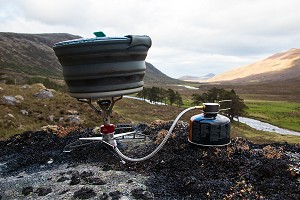
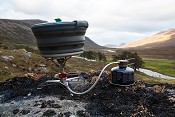
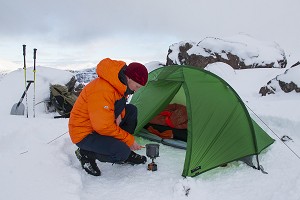
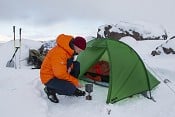
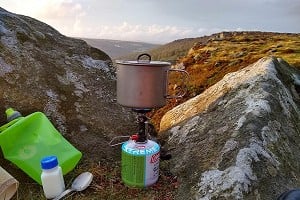
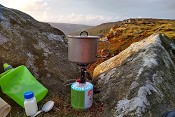
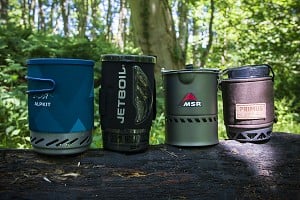
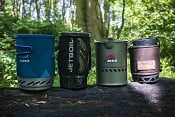
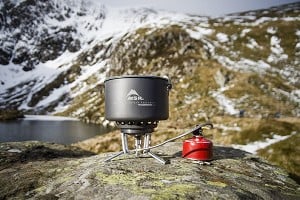

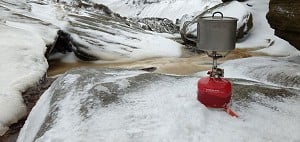

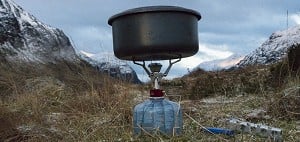

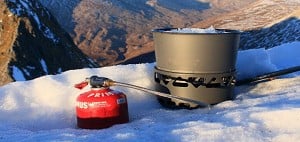

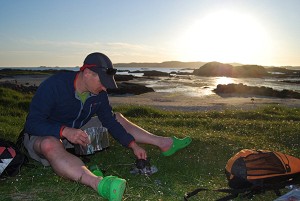



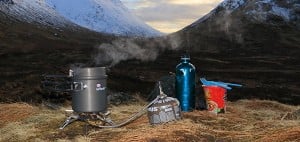

Comments
Stove reviews should also state amount of fuel used; boil time is the usual headline figure, but isn't very interesting for real world situations. Whereas fuel used is (see recent thread asking how much fuel would be needed for a trip).
I acknowledge that quoting fuel used with a gas stove can be difficult, because there's a control valve that varies flow rate, and 'up to 11' fast boil for that headline time will be inefficient, and finding the optimum setting for fuel used is difficult. But I would at least like to see fuel use for that headline fast boil.
It's a fair request. Very difficult to achieve with any degree of accuracy, and I wonder how (or if) we'd account for temperature, air pressure etc. But within the limits of my kitchen I could do at least a rough test of the Ulti vs Reactor on full output, simply weighing the canister before and after. I'll try to make time for that in the next few days
620g and £285 for a stove and pot?
You're not really selling it for me.
That's essentially the approach I used in my stove-building days; using my kitchen as reference. You need a means to determine 'boiling', too; I would put a loose lid on, and use the point at which a jet of steam emerged: the 'rolling boil' is very subjective. You can also make sure the starting temperature is the same, by using water stored in a fridge.
The MYOG stove-building community seemed to adopt 500ml as a test reference, though the US types did prefer 2 cups (with the added difficulty of the variety of 'US fluid ounce' definitions).
Can you really confirm that? Unless the stove actually has a gas pre‑heat tube, it shouldn't ever be used with the canister inverted, ever.
Unless you fancy big fireballs, that is!
If it does have one, then that would be its biggest bonus over the Reactor.